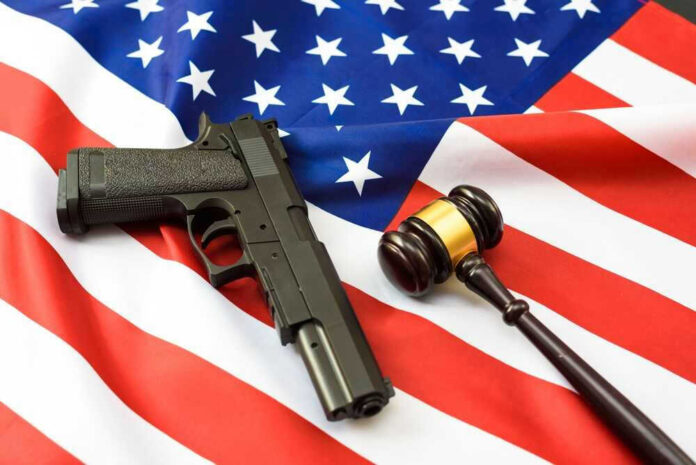
The Supreme Court’s refusal to hear Missouri’s gun sanctuary law marks a direct blow to state sovereignty and emboldens federal dominance over Second Amendment rights nationwide.
Story Snapshot
- The Supreme Court declined to hear Missouri’s appeal, ending the legal battle over its Second Amendment Preservation Act.
- Federal courts ruled Missouri’s effort to shield against federal gun laws unconstitutional, asserting federal supremacy.
- This decision undermines state attempts to resist federal gun control and sets a precedent against similar laws in other conservative states.
- Missouri lawmakers are seeking new strategies, but federal power over gun rights remains unchecked for now.
Supreme Court’s Refusal Ends Missouri’s Gun Sanctuary Effort
The Supreme Court declined to review Missouri’s appeal defending its Second Amendment Preservation Act (SAPA), a statute designed to prevent state and local law enforcement from enforcing federal gun regulations.
The move leaves intact lower court decisions declaring SAPA unconstitutional, signaling the judiciary’s firm commitment to upholding federal supremacy even in matters at the core of conservative values such as gun rights.
The decision effectively ends the legal viability of Missouri’s gun sanctuary strategy, a blow to state-level defenders of the Second Amendment.
Missouri’s SAPA, passed in 2021 and signed by Governor Mike Parson, was a direct response to what many saw as federal overreach on gun control during the previous administration.
The law imposed fines on local officials and police who enforced federal gun laws, modeling itself after “sanctuary” policies used by left-leaning states to shield illegal immigrants.
Missouri’s leaders argued SAPA was a necessary defense of constitutional rights, but the Department of Justice and local law enforcement quickly challenged it, warning the law would hamper crime-fighting and create chaos for officers on the ground.
Federal courts consistently sided against Missouri, culminating in this Supreme Court rejection.
Federal Supremacy Versus State Sovereignty on Gun Rights
The Supreme Court’s action affirms the long-standing principle that federal law supersedes conflicting state statutes, even on issues where local sentiment runs high.
SAPA’s defeat demonstrates the limits of state sovereignty in resisting federal authority—a troubling reality for conservatives who view the Tenth Amendment as a vital check on centralized power.
With this ruling, federal agencies regain unchallenged authority to impose and enforce gun regulations in Missouri and, by precedent, in other states considering similar “sanctuary” approaches. For many, this outcome represents yet another instance where Washington dictates terms at the expense of local control and constitutional liberty.
Gun rights advocates, including Gun Owners of America, supported SAPA and have argued that states must retain power to protect citizens from federal encroachment. Opponents, including several Missouri police departments and city governments, contended the law impaired law enforcement cooperation and jeopardized public safety.
The courts, however, maintained that the Supremacy Clause of the Constitution leaves no room for states to nullify or ignore federal statutes, regardless of legislative intent or local popularity. As a result, SAPA’s nullification stands as a cautionary tale for other conservative legislatures seeking to carve out havens for constitutional rights under threat.
Supreme Court rejects Missouri’s bid to defend gun sanctuary lawhttps://t.co/R7K4HA7FcG pic.twitter.com/cfLmrUOoXJ
— The Washington Times (@WashTimes) October 6, 2025
Political and Legal Fallout for Gun Sanctuary Movement
The decision’s ripple effects reach beyond Missouri. Other states—Wyoming, Idaho, and more—have adopted or considered similar gun sanctuary laws, inspired by the model Missouri pioneered.
The Supreme Court’s refusal to intervene sends a strong signal: such laws, even if politically popular, have little chance of surviving federal court scrutiny. Missouri lawmakers are already discussing revised strategies, but any new measures face an uphill legal battle.
The outcome also emboldens those pushing for stricter gun control, knowing that federal authority remains the final word, regardless of state-level resistance.
For conservative citizens and lawmakers, the Supreme Court’s move is a stark reminder of the ongoing fight to protect constitutional rights from erosion by federal power.
While gun owners face no immediate change to their rights, the nullification of SAPA curtails state-level protections and undermines efforts to resist what many see as a relentless drive toward nationalized gun control.
The legal precedent now set will shape the legislative landscape for years, making it harder for states to defend core freedoms in the face of centralized authority.
Expert Analysis and Broader Implications
Legal experts have largely agreed that SAPA’s legal foundation was vulnerable due to the Supremacy Clause, which designates federal law as the “supreme law of the land.”
Academic commentators note that while gun sanctuary laws echoed immigration sanctuary policies, courts have repeatedly upheld the primacy of federal law in both areas.
For law enforcement, the ruling brings clarity, allowing officers to resume cooperation with federal agencies in combating gun-related crimes.
Politically, the outcome is a setback for state-level activists and a victory for those advocating for uniform federal regulation. Ultimately, this episode underscores the enduring tension between state autonomy and federal power—a tension that remains at the heart of American conservative concerns.
Sources:
Supreme Court rejects Missouri’s bid to defend gun sanctuary law
US Supreme Court: Missouri Second Amendment Preservation Act gun laws
Supreme Court returns to the bench for new term, rejects dozens of legal battles



















